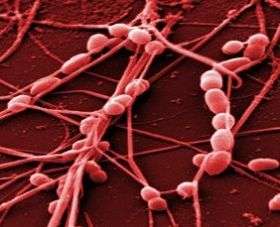Antibiotics administered during labor delay healthy gut bacteria in babies

Antibiotics administered during labour for Group B Streptococcus (GBS) affect the development of gut bacteria in babies, according to a study from McMaster University.
The research showed that babies exposed to the antibiotics for GBS during labour had a delay in the maturation of their gut bacteria, known as microbiota. The data also showed that this delay increased with longer durations of exposure to the antibiotics.
While the effects of antibiotics for GBS on the gut bacteria in babies was dramatic at early time points, they largely disappeared by 12 weeks of age.
The results were published today in the journal Scientific Reports.
"Early life microbial colonization and succession is critically important to healthy development, with impacts on metabolic and immunologic processes throughout life," said Jennifer Stearns, the study's first author, an assistant professor of medicine at McMaster University's Michael G. DeGroote School of Medicine and a scientist of the University's Farncombe Family Digestive Health Research Institute.
One out of every three or four pregnant women test positive for Group B Streptococcus during routine screening and the majority choose to receive antibiotic prophylaxis during labour to prevent GBS transmission to their infant at birth. Infant infections can lead to serious illness including meningitis and death in a very small number of infants, and antibiotic treatment is an important prevention strategy.
"Our research indicates there is a delay in the expansion of the dominant infant gut colonizer, called Bifidobacterium, when infants are exposed to antibiotics for GBS prevention during vaginal labour," said Stearns.
"It's a good sign that bacterial groups recover by 12 weeks but it's still unclear what these findings mean for infant health, especially since early infancy is such an important developmental time."
The study utilized data from 74 mother-infant pairs in the McMaster pilot cohort called Baby & Mi. Participants came from low-risk populations in Hamilton and Burlington, Ontario.
The gut bacteria development of the infants was tested at four points over the first 12 weeks of life, including at three days, 10 days, six weeks and 12 weeks.
The babies were healthy, full-term, breast-fed babies predominantly born vaginally, with a small percentage born by C-section that were also exposed to antibiotics to prevent surgical infection. As in previous studies, babies born by C-section had delayed expansion of the key gut colonizer compared to babies born vaginally without exposure.
Researchers at McMaster are using this study as a launching point for further research using the Baby & Mi cohort.
"A larger study is underway that will determine the long-term consequences of antibiotics administered during labour for GBS on both microbial succession and on health and disease risk," said Stearns. "This will help us explore in greater depth the influence of maternal and infant variables on the infant gut microbiome."


















